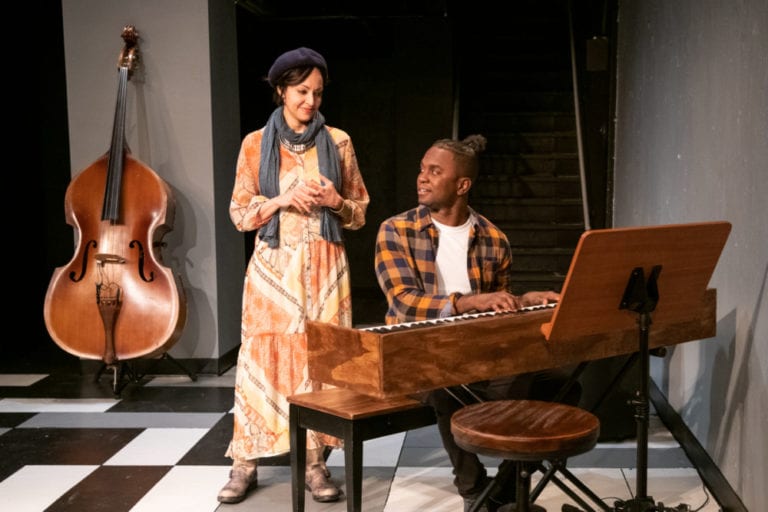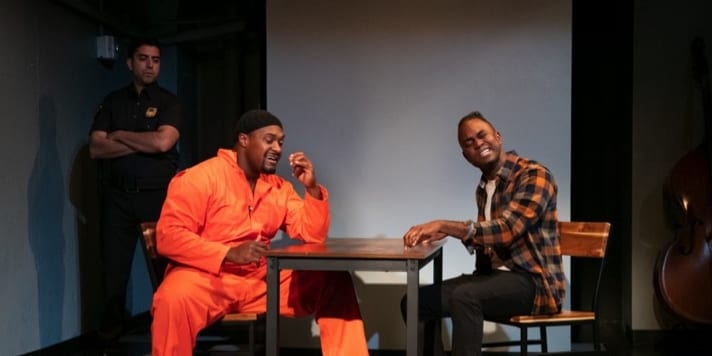“Jazz is about telling a story – your story, not playing note-for-note someone else’s.”
Every note of Bars and Measures, wonderfully composed by Justin Ellington, is played with deep purpose. The music sets the mood of each scene and clearly signals each change – many times music takes the place of dialogue when words just wouldn’t suffice. Bilal (Shabazz Green) and Eric (Roderick Lawrence) don’t need to discuss their brotherly bond; the seamless way they scat-sing in harmony makes it apparent. Low and high keystrokes mirror the mood in Eric’s living room, from plaintive to playful to grave as he and the vocalist Sylvia (Salma Shaw) converse at the piano. Even actions as simple as Bilal snapping on-beat as two lawyers debate his innocence in a trial speak volumes, conveying music as his anchor, his way to cope. Music is the way the characters see the world and how their own stories fit into it. It is the framework through which we’re invited to receive these stories.
But, this isn’t a concert – there’s a point where “music ain’t enough,” and that’s where Idris Goodwin’s script comes in. Music doesn’t reveal the reasons for the underlying divide between the brothers: Eric is Christian, interested in classical music, and is free. Bilal is a convert to Islam, staunchly against classical music as a means of expression (see the opening quote), and in jail on charges of financing an extremist terror group abroad. It doesn’t convey the Islamophobia and racial tensions Goodwin’s characters become steeped in, nor how these issues drive them apart to a point where music can no longer keep them together.
Together with John Salutz’s masterful lighting design, though, the words and the music come together to make a piercing whole that strikes a poignant social chord.

The play’s focus on the two brothers brings the sweeping themes of Islamophobia within the black community – and the turbulent national mood brought onto all of America by the War on Terror, at its height at the time of the play – to a manageable, personal level. Moreover, it highlights the issue of prejudice within the black community, an exploration oft-overlooked amid stories of white-versus-black conflicts. Goodwin does not shy away from the topic – as Eric learns more details about his brother’s deeds and his support for Bilal begins to diminish, we see his tolerance and their reciprocal understanding begin to break down. Green, as the notoriously rough-edged Bilal, delivers a suitably forceful performance on all fronts. His character is almost more affecting when he is “soft,” emphasizing how losing one’s support system (and finding spirituality) can bring out the vulnerability in even the toughest of people. The more sensitive, tender Eric is his perfect foil. He, in turn, stands out when he lets his more brute impulses take over. Eric’s horror at his brother’s crime leads to his denunciation of Islam and of the brothers’ musical connection – and yet, after he commits an act that physically manifests that breakdown, he essentially tells his brother (in different words): “I committed this violent act because I wanted to be like you for a while.”
And hanging in the balance between their loveliest melodies and harshest outbursts is us. The audience is the jury at the trial, the interpreter of the notes in Bilal’s musical composition. It serves as a kind of chorus whose voices aren’t heard in the play, but whose individual perspectives will make the events echo differently in each member – a central facet to the show’s complexity. (Abraham Makany and Salma Shaw do the job of bringing in other perspectives onstage, rounding out the cast as multiple small roles including a sardonic prison officer and a Muslim vocalist, respectively. Both have fairly thankless roles, but the latter gets to deliver an angelic rendition of a hymn and a few punchy lines toward the end about how Eric’s opposition to Bilal’s Muslim identity affects and invalidates more than just him, hurriedly but memorably driving home the play’s stance on xenophobia at large.)
I can’t expand upon Bars and Measures’ relevance to the black and Islam experience – it’s a story I’m neither able nor meant to tell. That story is embedded in the brothers’ scatting, the comfortable way the bass and piano rest beneath their hands, the equally tense way they debate their allegiances to different music and different creeds, Eric’s sentimental speeches about his brother, and Bilal’s litany of states that have seen an act of violence against Muslims. Go see it – no, go listen to it. The music will speak to you where my words will not suffice.

